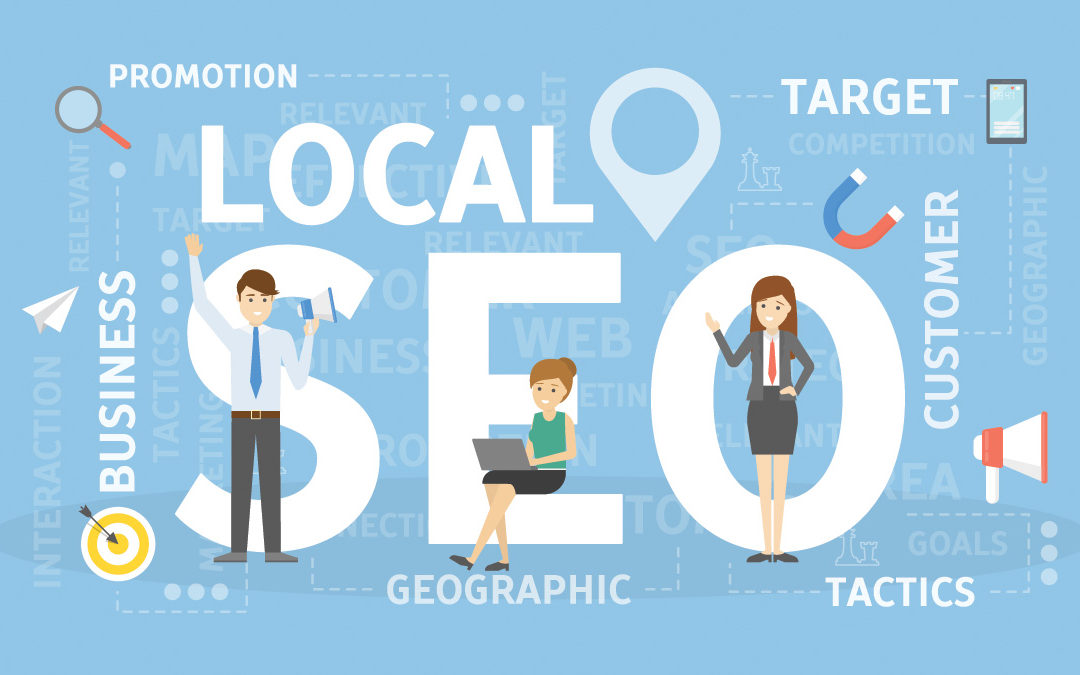That’s what local SEO (search engine optimization) is all about. It’s designed for people who live within a relative close range of your office to quickly and easily find you when they need your services.
How Does Local SEO Work?
Local SEO works by telling search engines that your small business is physically present in the city where your services are located and advertised. Generally, that means having a physical office location with an actual address that can be confirmed with search engines like Google. If a local SEO strategy is well-managed and well-executed, it can elevate websites over others in the same niche or market.
In recent years, search engines have started emphasizing local businesses and results rather than national or global results. That’s because businesses that people can easily visit in person are typically far more relevant to them than businesses that are hundreds or even thousands of miles away.
The 7 Pillars of Local SEO
At BHC Group, we optimize local search and SEO for our clients’ websites via a multi-pronged approach. That approach includes taking the following steps:
1. Understanding small business local SEO needs
Searches can generally be divided into two categories: those that are location-specific and those that aren’t. For example, searching for a recipe will bring up websites from around the world with that information, but searching for the best place to try a specific dish will bring up restaurants in your city or even your neighborhood that serve it. Placed-based results are extremely important for attorneys, especially in competitive markets, and they’re the heart of our local SEO strategies.
2. Completing and managing your Google My Business account
It’s not enough to just register your business and then wait for leads to roll in. When we manage our clients’ GMB listings, we optimize every aspect of them. That means verifying locations, providing all relevant contact and business information, accurately categorizing the businesses, uploading relevant photos and images, and listing hours of operation, just to name a few.
3. Optimizing your website for your local area
Websites are significant factors in local SEO success. Search engines reward businesses with websites that are heavily geared towards the cities, communities, or neighborhoods where they’re located, and they’ll give them better rankings when people nearby search for those types of businesses. Optimizing a website for local SEO means making sure it’s easily read by Google, and that once Google finds it, it loads quickly, is full of relevant local information, keywords, and content, and is mobile device-friendly.
4. Obtaining citations that refer back to your website and business
It’s not enough for Google to know that your small business actually exists as a physical business with a physical location. To truly optimize your local SEO results, it needs to know that other businesses—or at least other people—also recognize your existence. Your business can be “vouched for” by things like business aggregators and databases, consumer directories (including Yelp and YP), industry directories, and local directories. However, for citations to be effective, they must be consistent and accurate across the board.
5. Getting frequent, descriptive, and positive reviews for your business
Human nature means that we’re often skeptical of new things until we find out that others like them. Online reviews have made it easy to find out what dozens or even thousands of people think about a particular product or business, and more than 90 percent of consumers use reviews to evaluate local businesses. Google ranks reviews based who posted them, the number that have been posted, their content (including key phrases), diversity, and overall rating. However, Google doesn’t rely solely on its own review system. It also uses reviews from directories like Yelp and Facebook.
6. Utilizing the power of social media
Social media has transformed the way both individuals and businesses utilize the internet. It’s becoming more and more common for potential customers and clients to interact with businesses via social media platforms rather than calling or emailing them, and you don’t want to miss out on those opportunities. In addition, strongly crafted social media profiles also act as powerful citations for businesses.
7. Making your local search strategy match the behaviors of potential clients
Google has access to troves of data concerning the people who search for things related to your business, including those who go on to call you, email you, or message you on a social media platform. That information includes their locations when they initially submitted search queries and whether they visited your website after receiving search results. But Google doesn’t share that information. That means the best way to utilize Google’s powerful user database is to make your website as visible and engagement-friendly as possible in your local neighborhood. If people who live near your small business frequently use search results to call you, get driving directions to you, or actually visit your office in-person (with their mobile devices tracking their locations), your business will be considered more relevant to others in the area, increasing its local SEO strength.
We Can Make Local Search Work for You
At BHC Group, we know how to make local SEO one of the most effective advertising and marketing tools for small businesses throughout the country, and we have the track record to prove it. Trust our experience and history of success when it comes to transforming the performance of websites just like yours. Get in touch with our team of web marketing experts today by calling (615) 538-8254 or submitting our contact form.

